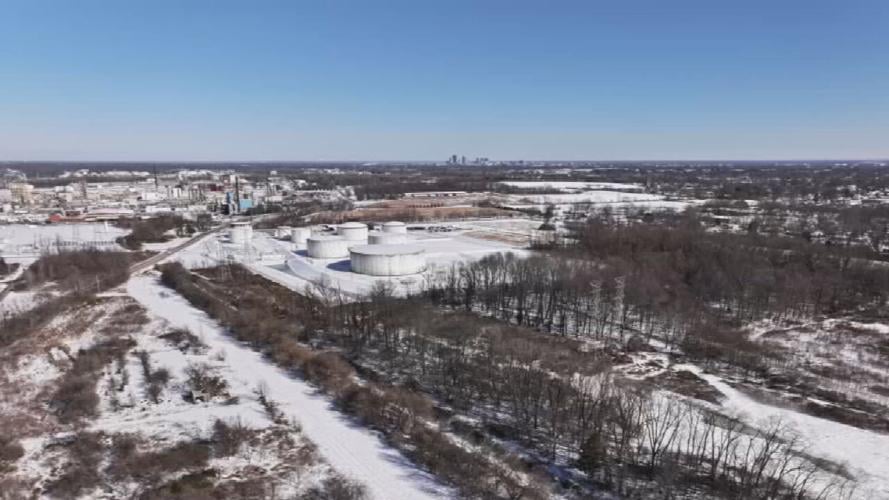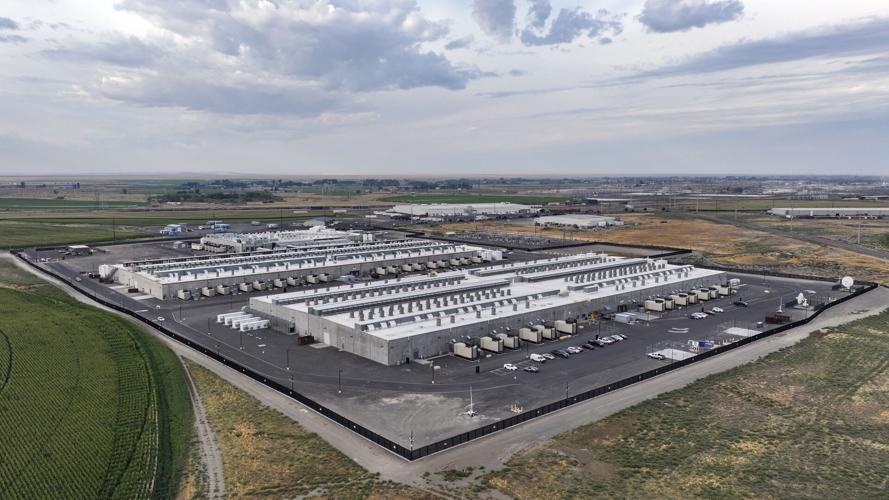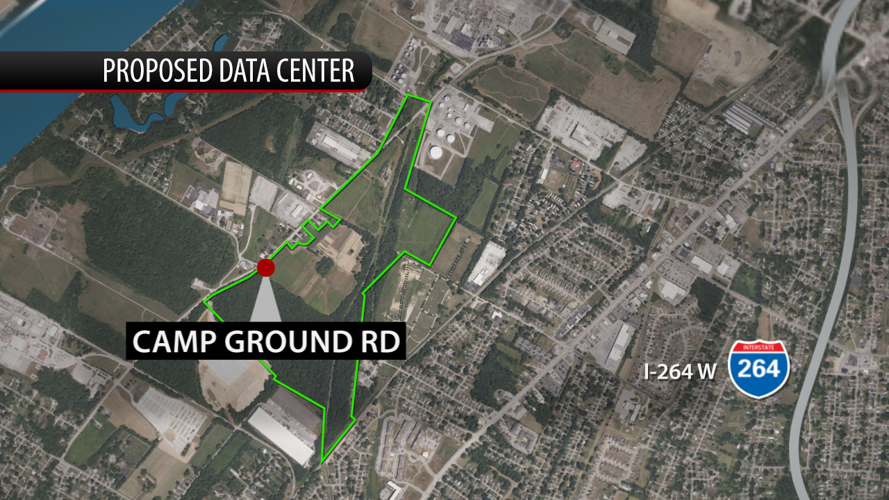LOUISVILLE, Ky. (WDRB) -- Developers plan to transform more than 150 acres in Louisville into Kentucky's first large-scale data center, a project meant to handle massive amounts of data from cloud computing, artificial intelligence and other demands of an increasingly digital world.
The campus on Camp Ground Road just west of Shively will be under construction this year and in use by late 2026, according to Louisville real estate firm Poe Companies and Virginia-based PowerHouse Data Centers. Officials with the joint venture say they're in talks with a handful of well-known technology companies to occupy the site.
The group of prospective tenants includes "hyperscalers" — tech giants like Google, Amazon and Microsoft that need thousands of servers, routers, cables and other components in order to store and process troves of information streaming from cellphones, computers and other gadgets.
"Louisville is just a natural place to locate in the country," PowerHouse CEO Doug Fleit said.

Amazon Web Services data center is seen on Thursday, Aug. 22, 2024, in Boardman, Ore. (AP Photo/Jenny Kane)
The city is appealing because of tax incentives the Kentucky General Assembly approved last year for data center projects as well as ample electricity, water and fiber connections, he told WDRB News in an interview this week.
Poe Companies CEO Steve Poe called it a "transformative project."
While there are no formal projections, the developers expect the data center will create hundreds of full-time jobs and employ perhaps up to 1,000 construction workers along with millions of dollars annually in property and other tax revenue for local and state coffers.
Data center construction has boomed in parts of the U.S. in recent years, although not in Kentucky or southern Indiana. But that began to change after Facebook parent company Meta announced plans last year for an $800 million project at the River Ridge Commerce Center in Jeffersonville, Indiana.
"Meta is a great bellwether, because when you look at Meta they are at all the important crossroads in this country," Fleit said.
PowerHouse, a division of American Real Estate Partners, lists nearly 60 data center buildings in its portfolio.
Analysts predict the number of large centers like the one planned for Louisville will double worldwide within the next four years. At the same time, some experts are touting the Kentucky region as a place to watch for future developments because of available land and power.
The Camp Ground Road site is just the first of what PowerHouse and Poe officials say will be additional large data centers they plan to develop in the region.
"Louisville is going to rapidly be an emerging market in data centers," Fleit said. "And you'll see this property be only one of several, which is why we want to grow this market."

The number of large data centers have been steadily increasing in recent years. Analysts predict up to 130 new 'hyperscale' centers will open each year in the foreseeable future. (source: Synergy Research Group)
'Access to the power'
The Camp Ground Road property sprawls across 153 acres near the Rubbertown industrial district, less than 1 mile from the Ohio River. The immediate area includes businesses and a smattering of homes.
Poe Companies, whose work includes the Aloft and downtown Marriott hotels and numerous commercial, industrial and housing developments, assembled the land with plans for warehouse buildings before pursuing the data center project with PowerHouse.
"It was kind of a rare bird to begin with, to be able to put together over 100 acres of contiguous property within Jefferson County," said Hank Hillebrand, president of Poe Companies. He estimated the total investment in the project at "several billions of dollars."
A data center is allowed on the property under Metro land-use rules, meaning that a zoning change isn't needed, Hillebrand said. There likely would be five to eight two-story buildings — a "true campus," he said.
Data center operations require considerable amounts of power, making available electricity one of the biggest factors in choosing a site, Hillebrand said. The Camp Ground Road property is just northeast of Louisville Gas & Electric Co.'s Cane Run generation station.
"It morphed into this use really because of the access to the power," Hillebrand said. "You know, the LG&E lines run directly through the middle of the site, and that enabled us to cheaply develop for power."

The data center is expected to eventually use roughly 400 megawatts — enough to power about 400,000 homes per month. But that would happen gradually, with plans calling for the first amount -- 130 megawatts -- available by October 2026.
LG&E aims to build a transmission substation to carry high-voltage electricity from power lines to a station owned and paid for by the developers that will distribute energy to the buildings there. Like other infrastructure for large projects, the utility-owned substation would be paid for by its customers.
LG&E has evaluated the additional demand from the proposed data center, said John Bevington, senior director of economic development for PPL Corp., of which LG&E and Kentucky Utilities are subsidiaries.
"We've gone through formal transmission studies, which have to be done to make sure that a load coming on our system isn't going to negatively or in any way impact our existing customer base," he said.
In the short term, LG&E officials say the local power grid can support the proposed Louisville data center.
"For this project, we are in good shape," said Chris Whelan, LG&E's vice president of communications. But, she added, "additional data centers coming onto our system would require extra generation."
In forecasting future power needs, LG&E and Kentucky Utilities told regulators it's likely that data centers built in their service areas will require between 1,050 and 1,750 megawatts of electricity within the next decade.
Bevington estimated that his team is in discussions with about 16-20 data center proposals at any given time.
"The interest and the inquiries are coming in on a weekly basis," he said.
That interest picked up, he added, after a bill giving some data centers sales tax breaks cleared the Kentucky legislature last year.
"It really did open up the opportunity flood gates for us and a variety of other economic development entities across the state to be talking about and working with data center projects," Bevington said.
Besides power, data centers can require large amounts of water to keep their systems cool. Developers of the Louisville project say it will benefit from the nearby Ohio River and the Louisville Water Co.'s extra capacity.
Kelley Dearing Smith, the Water Co.'s vice president of communications and marketing, said the amount of water needed for the data center ultimately depends on the tenant.
"With a very large water user like this looking at this, we will have to do improvements — and we already have talked about improvements for this area," she said.
She said the goal is for a new water transmission main or other infrastructure that serves the data center also to connect to other users in the area, allowing the costs to be spread out.
"Whatever we put in that area will also benefit customers in the south end and Bullitt County and potentially into Hardin County as well," she said.
The developers expect the data center will create hundreds of full-time jobs and employ perhaps up to 1,000 construction workers.
Legislation targets data centers
Bringing data center projects to Kentucky is "of paramount importance to the economic well-being of the Commonwealth," according to the legislation passed by state lawmakers. For now, those incentives apply just to certain projects in Louisville.
The new Kentucky law lets data centers that invest at least $450 million in city limits avoid paying sales and related taxes for 50 years on computer equipment and other gear.
Meanwhile, firms that do site development work could get those tax exemptions for up to 15 years.
Kentucky Senate President Robert Stivers, R-Manchester, credited Jeff Noel, secretary of Gov. Andy Beshear's economic development cabinet, and Katie Smith, the agency's deputy secretary, with helping craft the legislation with lawmakers. He called the effort "a really good example of how the system can work."
While sales taxes won't be collected, Stivers said there will be a benefit in other taxes, from property taxes to occupational and income taxes for workers at the data center.
"You create such a substantial increase in property values — that helps a lot of different people," Stivers said, adding that Jefferson County Public Schools will "probably be the biggest beneficiary."
Attracting businesses in emerging tech industries is a plank in the economic development plan championed by Louisville's Mayor Craig Greenberg, a Democrat. In an interview, Greenberg said the data center project is forward-looking and helps raise the city's profile.
"It sends a signal that we are a great place for technology businesses of today and tomorrow to locate, that we are going to be a city where we support software engineers, coders, tech businesses, businesses that are driven by AI."
Neighbors weigh in
The site is less than 1 mile from Wayne Mayberry's pizza parlor at Cane Run Road and Lees Lane. For Mayberry, co-owner of Annie's Pizza, the construction and full-time jobs there could mean more business at the store known for its 28-inch pies.
"I just hope to see that they do hire people from this area," he said. "People can be closer to home, closer to work — better for the community and for the people that live here."
Greater Louisville Inc., the chamber of commerce group, called the project an example of how changes to Kentucky's available business incentives help economic development deals.
"GLI is continuing to advocate for the expansion of existing incentives and the creation of new incentives to fuel growth in the business services sector and other industry clusters with high growth potential," said Sarah Davasher-Wisdom, the chamber's president and CEO.
But the massive energy needs of a data center are a concern to Eboni Cochran, an environmental advocate who lives in Chickasaw and has pushed to make Rubbertown companies accountable.
"We're in the midst of a climate crisis," she said. "And when you're talking about bringing in a development that is going to be hogging up lots of energy, using lots of water, I think that developers have not caught up to the fact that they need to fortify infrastructure even more than they ever have."
Cochran also said she fears construction workers and the data center's eventual employees will be "in the pathway of hazardous chemicals coming from the Rubbertown chemical facilities."
Louisville Metro Council member Tammy Hawkins, D-1, who represents the area, said she is "very excited" about the announcement, calling it a good investment for the area that will create new jobs.
Copyright 2025 WDRB Media. All Rights Reserved.





